On October 19, 2016, then-candidate Donald Trump said, “We have some bad hombres and we’re going to get them out.” Not only did his comment rile up people on both sides of the issue, he also struck a chord with the musician/composer Antonio Sanchez who created the unique score for the Oscar-winning film Birdman. Sanchez has two shows in Los Angeles this weekend.
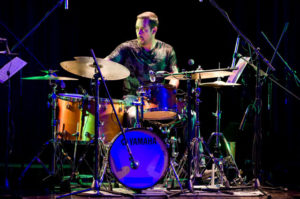
The first concert offers Sanchez performing the score to Birdman live at Royce Hall on Friday. On Saturday, Sanchez and his band Migration will perform at the Theatre at the Ace Hotel. I recently spoke with Sanchez about these two concerts and also about his Grammy-nominated record, Bad Hombre.
The title of your most recent album doesn’t require much time to figure out the inspiration. How can non-verbal music make political statements, particularly in our culture that seems to respond more to imagery?
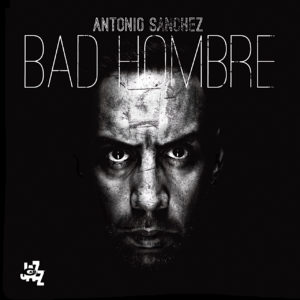
I think it is very capable of doing that. I think the way you name the project or a specific tune can give the listener a really good idea of where you were at when you created it and what was going through your mind. I’m surprised not more people are doing that to be honest. Jazz musicians tend to be some of the most liberal people and I don’t see that much stuff coming out that’s reflecting on the current situation.
There’s a line in Birdman that seems to apply here. “People, they love blood. They love action. Not this talking, depressing, philosophical bullshit.”
To me it goes beyond artists. It’s civil duty at this point. As an American citizen, as a Mexican citizen, as a human being, just seeing what’s being circulated rhetorically, actively and politically. What ICE is doing to people who are just living their lives and were not any harm to society, but the other way around, they were contributing. I have seen things in the news of people in rural America that were surprised that their friends were deported. They had no idea they were illegal and they owned a restaurant and they were sad – even though they agree with the immigration policies of Donald Trump. It’s great, until it impacts you directly.
The line to or from Birdman to Bad Hombre seems short. How did your Birdman experience inspire Bad Hombre from a musical point of view?
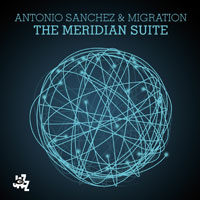
Birdman actually informed Bad Hombre and my previous record, The Meridian Suite, which we will be playing in Los Angeles. The way it informed Meridian Suite is it’s a very cinematic piece that’s conceived as a continuous composition – we start and we don’t stop until the end. It was my attempt to write a musical novel. I had a chance to develop the characters over an extended period of time instead of ten different characters in ten different songs. I love developing a story in a more concise way. The characters have the melodies, motifs and rhythms that are played through the piece.
Bad Hombre was informed by the impact that I realized drums could have for people. Bad Hombre is very visual in a way. It’s very cinematic and has a lot of texture. I wanted to continue on that road, but make my own version. Birdman I was trying to satisfy director Alejandro Iñárritu’s vision. This time my only limitation was my imagination. Technologically speaking I learned all this new stuff. A lot of things that happened in the album were by mistake. Trial and error and “what happens if I push this button?” I kind of enjoyed that process because it was very intuitive and it sparked my imagination in very different ways than my conventional albums.
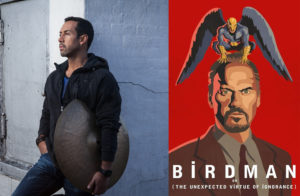
Was not being nominated for an Oscar for Birdman a blessing in disguise?
I’m not sure what would have happened if I had been nominated. But I’m sure the controversy of the elimination of the score [it was disqualified because of the number of minutes of source music also used] was great publicity. I don’t think they would have let me win if I had been nominated, but it made it so the score and my name were being circulated.
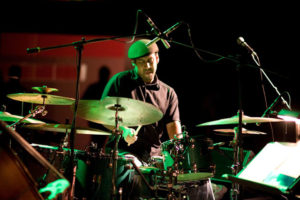
You’ve spoken of that score as being an improvised experience. Fans wanting to hear note-for-note the same music in the film might be in for a surprise. How much do you vary each performance?
They vary quite a bit. I try to maintain the dramatic impact of what was created. I know the movie so well that I take my liberties. I wish I could do the movie again because now I know it better. Every performance is different, but as a jazz musician I react organically to what is going on around me.
What do you and the audiences get from live performance?
To me music is the most interesting mind-enhancing drug. It’s fascinating that you can get ten or 10,000 people in a field and all they are doing is absorbing sound waves. That makes you feel something. That makes everyone feel something different. To me that’s incredibly fascinating – the nature of music and what happens to people.
Through music, and it’s been done many times with social change and empathy, the possibilities are endless. I’m getting involved in a project called Tiny Walls. That is going to bring musicians that live in the United States to the US/Mexico border and we’re going to perform with musicians on the other side of the border to make it obvious that walls do not exist when it comes to humanity, empathy, art and culture. It’s just one human relating to another human. I think art and music are some of the most powerful tools at our disposal.
Photo Credits: Main photo courtesy of CAP-UCLA, all other photos by Fernando Aceves and courtesy of AntonioSanchez.net.











